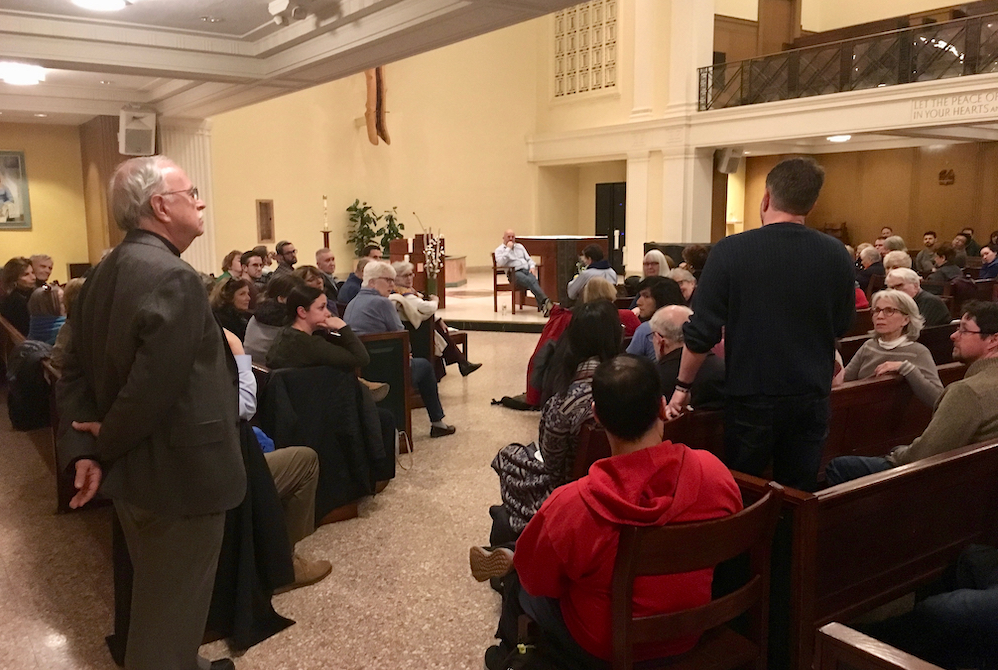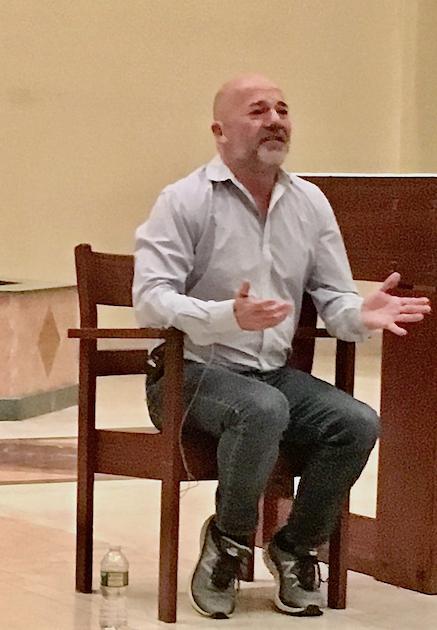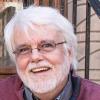
Audience at "The Catholic Clergy Abuse Crisis and Homosexuality: The Problem of Scapegoating" with Andrew Sullivan, at front, Feb. 26 at the Paulist Center in Boston (Bill Mitchell)
It's been a while since I showed up for a mission preacher at my local parish. But Andrew Sullivan's visit to the Paulist Center in Boston last week had the same feel: A bracing message aimed at jolting those of us in the pews into a deeper understanding of an important dimension of our faith. In this case: the role of homosexuality in Catholicism.
Sullivan was invited by the center's adult education and LGBTQ committees to address the scapegoating of gay priests in the clergy sexual abuse scandal, a topic he addressed in detail in a piece published last month in New York Magazine.
He was introduced to the gathering of more than 100 people by Paulist Center member Bob Bordone as a "leading intellectual of our times" who is both "openly Catholic and openly gay."
Arranging himself in a chair by the altar in the center's chapel, the 55-year-old Sullivan said: "I asked to sit because I don't want to be in a pulpit. That was a path I didn't take."
Though seated, he spoke passionately about what he sees as a grave threat to the faith he continues to love and practice — not gays in the priesthood but the failure of the church to accept gays in the priesthood.
"The question for the church is, 'Can we hang in there through the trauma [of the abuse crisis]?' " he said, arguing that it "will not hang in there by denying the reality of homosexuality" in its midst.
Describing the scapegoating as "wicked, evil and wrong," he sketched a more complex picture of the gay Catholic experience and the culture fueled by its institutional oppression.
He began with his own story growing up in an Irish-Catholic family in Britain: "The first person I came out to was God. I didn't know who else to talk to."
He added: "My sexual orientation and my faith have always been entwined. One of the interesting questions to ask ourselves is, 'Exactly what is that particular charism? Why is it that so many gay kids are attracted to the faith?' "
Sullivan, who holds a master's degree in public administration and a doctorate in government from Harvard, challenged the roots of Catholic objections to homosexuality — Aquinas' contention that homosexual acts are against nature — with a question: "How can something that is found everywhere, that is clearly a part of someone's nature, yet be against nature?"

Andrew Sullivan (Bill Mitchell)
If the possibility of procreation is really so essential to acceptable sexuality, he argued, why is the church so willing to approve the marriages of infertile or elderly heterosexuals?
Over the course of his 45-minute talk, he returned repeatedly to an unintended consequence of the church's failure to accept homosexuality: the corrosive influence of an omertà that has encouraged some gay clergy to remain silent about abuse they "witnessed or knew of" rather than risk retaliatory exposure — not as abusers but simply as gay.
"This collective closet became a machine for abuse with no one reporting anything," he said.
The best way to begin changing that culture, he said, is for the church hierarchy to encourage gay priests to come out to their congregations.
Sullivan's most recent article for New York reviews the explosive new book exploring homosexuality in the highest ranks of the church, In the Closet of the Vatican: Power, Homosexuality and Hypocrisy, by Frédéric Martel, excerpted last month by NCR.
Sullivan is far more accepting of Martel's portrait of the Vatican as a place with "one of the biggest gay communities in the world" than some reviewers who challenge the book as long on gossip and short on evidence, a vaguely-sourced "stockpile of ammunition for militant right-wing Catholics."
Still, Sullivan's larger point strikes me as valid: The dishonesty and hypocrisy displayed by gay church leaders — whatever their number — is standing in the way of respectful and healthy treatment of gay priests. And until the church begins encouraging honesty instead of deceit, acceptance in place of exclusion, it's difficult to imagine how the institution can heal from so many self-inflicted wounds.
"The idea that we can confront this [abuse] crisis without confronting the deeper crisis of homosexuality within the church is a delusion," Sullivan argues. "If we really want to get this right, we have to have a conversation about this."
Advertisement
During a question-and-answer session, a man who identified himself as a priest took the microphone and declared, "I was born a gay man."
He said he was tired of hiding who he is and worried that there might be a gay youngster in his congregation being harmed by the church's views and policies regarding homosexuality.
"I'm trying to get my provincial to let me talk about this," he added. "I'm thinking about leaving. I am standing here asking what can guys on the ground like me do?"
Sullivan responded: "I'm not in a position to tell you what to do. All I want to say is thank you for the work you do in the circumstances you're forced to do it. It breaks my heart that you have to endure this. It's just wrong."
He added: "I've talked with many people like you and they are exhausted. They are some of the most amazing priests doing God's work. They're the best we've got in many respects, and they are treated like this. My feeling is they should all come out. We have power."
In a follow up conversation, the priest, who asked that his name not be published, said: "What frustrates me more than anything else is the expectation of silence. And what angers and frankly hurts me more than anything else is what I understand to be a desire [on the part of the church] that I not be there."
[Bill Mitchell is a former NCR board member and a member of the pastoral council at the Paulist Center. You can reach him at bmitch@gmail.com.]








